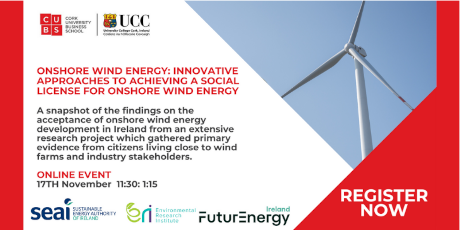Early engagement key to community windfarm acceptance, new research finds 09 Nov 2023

- Early and meaningful engagement, compensation to near-neighbours, amenity development all help acceptance of local onshore windfarms.
- Co-ownership arrangements also positively impact local residents' engagement though are not a silver bullet.
- Findings to be discussed at online event this Friday.
Early and meaningful engagement at the pre-planning stage, compensation to near-neighbours, and the development of community amenities are some of the measures that increase the likelihood of acceptance of new wind farms in Ireland, new research has found.
The CoWind research project also found that community ownership and co-ownership arrangements can positively impact local residents' acceptance of wind farms.
The project’s findings are to be discussed at an online event this Friday at 11.30AM.
Co-Wind is led by Dr. Bernadette Power of the Department of Economics at University College Cork, in partnership with additional Cork University Business School researchers and the wind energy developer, FuturEnergy Ireland.
The unique project aimed to better understand and enhance community engagement in wind energy through various measures including public participation in decision-making, direct investment and co-ownership opportunities for the public.
It also seeks to foster stronger connections between communities and wind energy projects and to enhance benefit sharing mechanisms to make them effective in the Irish setting. The project's findings offer a comprehensive understanding of the factors influencing wind farm acceptance, particularly within the context of community-developer relationships.
Dr. Power said:
“Our research has yielded significant findings shedding light on the dynamics of community acceptance of onshore wind farm energy developments in Ireland. This offers a roadmap for fostering a "social license" for the construction, ownership, and operation of wind energy projects in communities across Ireland, reinforcing the importance of community involvement and understanding in the renewable energy sector.
“Our work underscores the complexities of improving community relationships, particularly in the pre-planning/planning stage and for residents living in close proximity to wind farms. The insights generated from the study will inform recommendations for building trust and fostering positive community-developer relationships, emphasizing the importance of early and transparent community engagement, addressing concerns, and implementing participatory approaches.”
“Our approach was largely quantitative but was also supplemented with interviews with key stakeholders including developers, Community Liaison Officers, policymakers. We visited wind farm communities and we also examined third party appeals to
Chief findings and insights include:
- Engagement is key: The quality of early engagement during the pre-planning/planning stage has both an immediate and long-term impact on community support for onshore wind farms. Feeling empowered and included in the project's decision-making process is essential for positive community engagement.
- Role of Near Neighbours: Near neighbours of wind farms are most likely to take action opposing a proposed wind farm, primarily in the pre-planning/planning stage, although this diminishes as the project advances. This emphasizes the need for strong engagement at the early stages of development.
- Importance of Neutral Third-Party Intermediary: Respondents believed that a neutral third-party intermediary is the most effective mechanism to influence the design of wind energy projects.
- Community Benefit Sharing: The research highlighted that while direct payments to near-neighbours and a community benefit fund for green and sustainable initiatives had the most substantial impact on general acceptance, non-monetary community benefits, such as the development of local amenities, play a significant role in wind farm community acceptance across all stages of development.
- Community Ownership and Co-Investment: Community ownership and co-ownership arrangements can positively impact local residents' acceptance of wind farms. However, they may not entirely resolve opposition among those living in close proximity. Efforts to encourage citizen participation in community-owned projects may require addressing financial and regulatory challenges, as well as building trust between communities and developers.
This project has been funded by the Sustainable Energy Authority of Ireland under the SEAI Research, Development & Demonstration Funding Programme 2018, Grant number 18/RDD/281.
To register for this event: https://www.cubsucc.com/events/onshore-wind-energy--innovative-approaches-to-achieving-a-social-license-for-onshore-wind-energy/